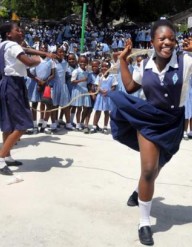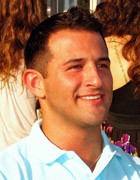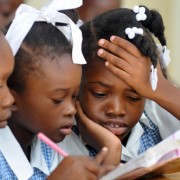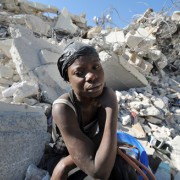When a Haitian says, Dèyè mòn gen mòn (beyond mountains there are more mountains), they mean to say, as you solve one problem there is always another that must also be solved.
Driving through the densely populated city of Port-au-Prince, where I visited for two and a half weeks in early January, I wondered how many times this old proverb was the subject of conversation this past year. In the months following the Jan. 12, 2010, earthquake, Haitians endured the devastating effects of Hurricane Tomas, political instability, and violence stemming from a presidential election and a cholera epidemic.
Foreign aid workers continue the behemoth task of delivering the humanitarian and development assistance so desperately needed by the Haitian people. Despite some media reports of stagnant progress, one only has to scratch the surface to realize some programs are making a real difference.
I decided to sit down with USAID beneficiaries from Haiti's infamous Cité Soleil, an extremely impoverished and densely populated urban slum generally regarded as one of the most dangerous areas in the Western Hemisphere.
Here, Etienne Jean-Gardy and Ernancy Bien-Aime are two youth educators trained by the USAID Leadership Development Program (LDP), which teaches community members about the importance of family planning and HIV prevention and awareness. Armed with knowledge received in training, they host meetings in local parks, in homes, and in schools to disseminate their message in Cité Soleil.
Etienne, a shy, soft-spoken young man in his mid 20s, told the story of a woman who passed away five years ago when her body succumbed to the devastating effects of AIDS. When she learned her HIV status, she instinctively had her seven children tested. Three of her daughters also tested positive. Distraught and shamed by family and friends, she was forced to pack up her home and find a new place to live.
Not long after relocating, she visited the Maison Arc-en-Ciel clinic where she met with LDP youth educators. She eventually came to terms with her status. She was so grateful for the mentorship that she dedicated the little time she had left to her seven children and mentoring others on the importance of family planning and HIV awareness and prevention.
When he finished his story, Etienne leaned over to Dr. Alexandra Emilien, the senior program officer for LDP, who was also playing the role of translator, and whispered something in her ear. Etienne wanted her to tell me the woman in the story was his mother, and she is the reason he joined the program.
More Men; More Services
Ernancy, by comparison, is a self-assured and outspoken woman who talks passionately about her role as a youth educator. Her confidence makes her an incredible asset to the program as she interacts with people in the community.
I asked if she felt being a youth educator was her calling.
Thinking for a minute, she recalled one of her first meetings as a youth educator. A woman approached her after a presentation on HIV prevention and family planning. The woman was 25 years old and already had four children. She had never even heard of family planning, and was grateful she attended the session that day. Ernancy and a few colleagues gave her money to take a tap-tap (local bus) to a local clinic for family planning services.
"I remember thinking about the opportunities she missed out on because she had children at an early age: education and independence," Ernancy said. "That is when I realized the importance of this information."
She explained that people want these services once they are made to understand the benefits.
In the past few years, she noted that more and more men come to the clinic to support their wives and girlfriends. "When the men come with women to the clinic, you know they see the benefit," she said laughing.
Clinics in Cité Soleil are beginning to offer HIV testing and family planning services as part of a package because, as both youth educators attested, when you offer more services, people are more likely to come.
"Most people don't have money or the time to take two cabs to two different places," Marjorie Eliacin, the project's communication officer said. "It just makes sense to offer everything in one place."
After the interview, I talked more informally with Etienne and Ernancy. They were both polite, smartly dressed, and well-spoken. They are both educated and compassionate. They envision a future where people have the information they need to help themselves. As youth educators, they have that information thanks to LDP and they are eager to share what they know with others.
Now back at a desk in Washington, D.C., I recall the sense of optimism I felt listening to the stories of these youth who have invested themselves in the future health and prosperity of Haiti. Their work is important and it is making a difference. The support they receive from USAID programs provides them with the training and resources they need to continue their work. I continue my work with a renewed sense of purpose. My hope is that their stories will inspire others and will demonstrate the continued need for USAID support.












Comment
Make a general inquiry or suggest an improvement.